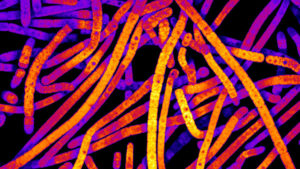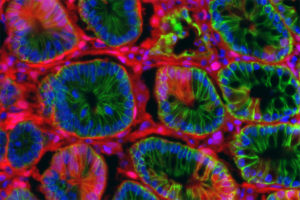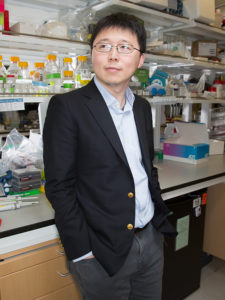Accelerating gene discovery
Accelerating gene discovery
Editing Ourselves
Accelerating gene discovery
With the CRISPR system, researchers can diagnose, detect, and potentially treat a host of diseases within the body using gene editing.
CRISPR systems leverage a key feature of a bacterial defense system — Clustered Regularly Interspaced Short Palindromic Repeats — to target and edit specific stretches of genetic code, enabling scientists to tailor DNA within living cells and organisms much more easily than before.
MIT scientists are already using CRISPR systems to build sensitive tools for diagnosing human diseases and to accelerate the pace of research by quickly creating cell and animal models. In the future, CRISPR may make it possible to correct mutations in order to treat genetic causes of disease.
Highlights
Editing Ourselves
Editing Ourselves
Using nature's tools to edit our genome. MIT scientists contribute to one of the century's most profound biological discoveries. Directed by Sarah Klein & Tom Mason of Redglass Pictures for the MIT School of Science. 2020.
Your browser does not support video embeds, please follow the link below to watch the video.
https://www.youtube.com/embed/ZGZYhX4-xH4?feature=oembed&controls=1&hd=1&autohide=1&showinfo=0&modestbranding=1&rel=0&color=whiteFighting lung cancer with CRISPR
Fighting lung cancer with CRISPR
New pathway for lung cancer treatment
Researchers in the Jacks lab used CRISPR to screen small cell lung cancer cell lines for genes that already have drugs targeting them, or that are likely to be druggable, in order to find therapeutic targets that can be tested more quickly and easily in a clinical setting.
DNA repairing "jumping genes"
‘Jumping genes’ could help CRISPR replace disease-causing DNA, study finds
DNA repairing "jumping genes"

The jumping-gene version of CRISPR is most likely to [be] best [over] the classic version when curing a genetic disease requires making a gene function normally by replacing its misspelled DNA “letters.” CRISPR tries to do that by cutting out the mutation (like Word snipping out fi from orthografi) and offering up the correct letters (phy).
Speeding up cancer research
Introducing genetic mutations with CRISPR offers a fast and accurate way to simulate disease.
Speeding up cancer research

Using the CRISPR gene-editing system, researchers have shown in mice that they can generate colon tumors that closely resemble human tumors. This advance should help scientists learn more about how the disease progresses and allow them to test new therapies.
Genome Editing with CRISPR – Cas9
Genome Editing with CRISPR – Cas9
The CRISPR-Cas9 method for genome editing is a powerful technology with many applications in biomedical research, including the potential to treat human genetic disease.
Your browser does not support video embeds, please follow the link below to watch the video.
https://www.youtube.com/embed/2pp17E4E-O8?feature=oembed&controls=1&hd=1&autohide=1&showinfo=0&modestbranding=1&rel=0&color=whiteIt's elementary
It's elementary
CRISPR isn’t just for gene editing anymore
Scientists have unveiled a rapid, inexpensive, highly sensitive CRISPR-based diagnostic tool called SHERLOCK. Now, a strip of paper can indicate presence of pathogens, tumor DNA, or any genetic signature of interest with 100-fold greater sensitivity, the ability to detect multiple targets at once, and other new features that further enhance SHERLOCK's power.
The Team
News
-
Rationale engineering generates a compact new tool for gene therapy
May 28, 2025
-
An ancient RNA-guided system could simplify delivery of gene editing therapies
February 27, 2025
-
CHARMed collaboration creates a potent therapy candidate for fatal prion diseases
June 27, 2024
-
Scientists develop a rapid gene-editing screen to find effects of cancer mutations
March 12, 2024
-
‘Treasure trove’ of new CRISPR systems holds promise for genome editing
November 23, 2023
-
Thousands of programmable DNA-cutters found in algae, snails, and other organisms
October 13, 2023
-
Gene-editing technique could speed up study of cancer mutations
May 11, 2023
-
After a decade, CRISPR gene editing is a 'revolution in progress.' What does the future hold?
January 30, 2023
-
Catching cancer in the act
January 22, 2021
-
Regulating the regulators
November 24, 2020
Please contact Jennifer Rosales if you are considering a gift to the School of Science.







